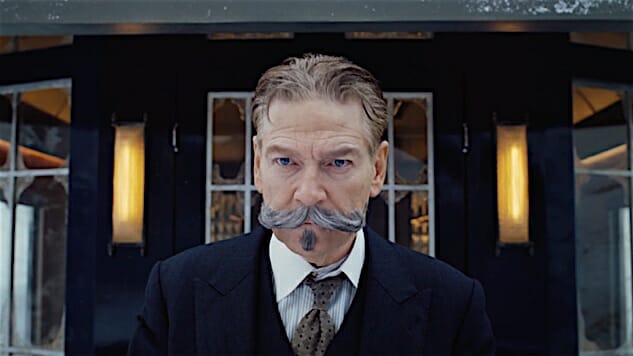Murder on the Orient Express

1. Murder on the Orient Express wants you to be as proud of it as it is proud of itself. The movie looks like a million bucks, shot on 65 millimeter and packed with all sorts of fashionable, detailed décor with all sorts of stately, safely “unconventional” camera angles (including whole scenes in which we only see the top of characters’ heads) that seem like director Kenneth Branagh is desperately trying to revive all of those old Orson Welles comparisons he got 25 years ago. But the movie is embalmed in its own self-regard. You watch it from behind glass, a museum piece you aren’t allowed to touch. Branagh was trying to make something timeless. But he just made something endless.
2. Branagh casts himself as the famous investigator Hercule Poirot, which is sort of his first problem. Branagh can be a restrained, powerful actor—he might have the best role in Dunkirk—but when he directs himself, he has a tendency to dial up his ham. The meter goes to 11 here; Branagh is winsome and twinkly and getting a rather huge kick out of himself, playing Poirot as an over-the-top, almost cartoonish character, with his wild mustache and silly quirks and a desperate look-at-me insistence that, frankly, is difficult to take throughout. This is a particular problem because Branagh is on screen just about every second of the film, while his massive international cast of actors, almost all of whom are more famous than Kenneth Branagh, basically whiz past the camera and wave before it settles back on Branagh and his thundering mustache. Anytime you want the movie to stop and linger on a particularly compelling story bit or a character, it lands on Branagh again, doing his little dance.
3. The story is … well, it’s Murder on the Orient Express. It has been told so many times that it’s more about the execution than the actual storytelling. Branagh’s decision is to make it so steeped in the past that he gets some sort of “throwback” praise out of it, but rather than breathe life into the enterprise, he sucks all the oxygen out of it. The mystery itself—the gathering of clues, the interviewing of suspects—it all plays as if being looked at through a telescope. It’s fun to look at—the movie pops visually, if not narratively—but it’s airless and joyless. There is no buildup to the mystery, no crumbs for the audience to compile on their own. Branagh ends up denying those who don’t know the story the pleasure of figuring out the mystery themselves, and he denies those who do the experience of seeing the story told in a new way. It’s a movie that burns out at both ends.
-

-

-

-

-

-

-

-

-

-

-

-

-

-

-

-

-

-

-

-

-

-

-

-

-

-

-

-

-

-

-

-

-

-

-

-

-

-

-

-








































